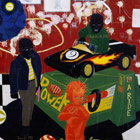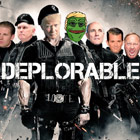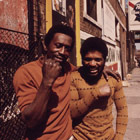
Modern Family
It is no accident that our age of hyper-capitalism is also one of aggressive “family values,” pursued in popular culture and legislation alike.


It is no accident that our age of hyper-capitalism is also one of aggressive “family values,” pursued in popular culture and legislation alike.

“He Will Not Divide Us” posited that we could all get along—but instead became a petri dish of American division.

Kim Stanley Robinson’s New York 2140 refuses the typical binary of climate change fiction, offering hope for a future somewhere in between victory or ruin.

Kim Phillips-Fein discusses her new book, Fear City: New York’s Fiscal Crisis and the Rise of Austerity Politics, and who killed the social-democratic city.

In his quietly devastating book Another Day in the Death of America, Gary Younge argues that all Americans, not just the ones who pull the trigger, are complicit in gun violence.

Ken Loach’s I, Daniel Blake shows the cruelties of the UK’s benefits system, but fails to challenge the idea that benefits should only go to the “deserving” poor.

Understanding the “alt-right” means spending less time looking to its leaders for ideological coherence and more on understanding how its base exercises power.


George Borjas argues that a protectionist approach towards immigration would be good for American workers. Economists almost universally disagree.


Jan-Werner Müller’s understanding of populism is built on a theory of anti-totalitarianism designed for an enemy that no longer exists.


The films about slavery that came out during the Obama years have given us more powerful and nuanced representations of slavery than we have seen before.

Today, the term “ghetto” comes across as at best anachronistic, at worst offensive. Does it still have any value?

From Dolly Parton to J.D. Vance, rags-to-riches stories obscure as much as they inspire, reinforcing the notion that poverty can be solved by dreams and gumption.

Somewhere between the apostles and Joel Osteen, mainstream Christianity turned from a wellspring of egalitarian promise into yet another exponent of the market gospel. Two new books chart where things went wrong.

Two new histories show how the CIO of the 1930s and ’40s led the charge for racial equality not just on the shop floor but at the national level, precipitating the Democratic Party’s embrace of civil rights.

Oliver Stone’s Hollywood retelling of the Snowden saga ends up depicting surveillance as little more than an inconvenience that might threaten our sex lives.